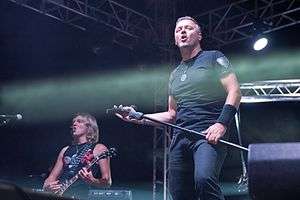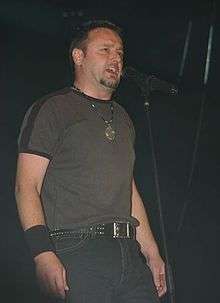Marko Perković
| Marko Perković | |
|---|---|
 Marko Perković, 2013 | |
| Background information | |
| Born |
27 October 1966 Čavoglave, SR Croatia, SFR Yugoslavia (present-day Republic of Croatia) |
| Origin | Croatia |
| Genres | Pop rock, album-oriented rock, folk rock, hard rock, heavy metal, progressive metal |
| Occupation(s) | Singer-songwriter |
| Instruments | Vocals |
| Years active | 1991–present |
| Associated acts | Thompson |
Marko Perković (born 27 October 1966) is a Croatian musician and has been the lead singer of the band Thompson since 1991.
Perković was born in Čavoglave, SR Croatia, SFR Yugoslavia (present-day Republic of Croatia). He participated in the Croatian War of Independence (1991–95), during which he started his career with the patriotic song "Bojna Čavoglave". In 2002 he started his first major tour after the release of the E, moj narode album. Since 2005, he has been organizing an unofficial celebration of the Victory Day in his birthplace of Čavoglave. During his career, he has been accused of promoting extreme nationalism and of glorifying the Nazi-affiliated Ustaše of the Independent State of Croatia, for which he has been banned from performing in Switzerland in 2009. The ban was subsequently lifted and he continued having concerts in Switzerland.[1]
Early life

Marko Perković was born in 1966 in Čavoglave (at the time SR Croatia, SFR Yugoslavia) to Marija and Ante. He rarely saw his father, who worked as a Gastarbeiter in Germany and rarely came home. He finished high school in Split. In 1991, Croatia declared independence from Yugoslavia, prompting the Croatian War of Independence. He joined the Croatian National Guard where he was given the American Thompson gun, which became the nickname given to him by his battlefield comrades.
It was while he was defending his home village that Perković became inspired to write one of the most popular songs during the war: Bojna Čavoglave (Čavoglave Battalion), which launched his music career. In 1992, Perković held concerts throughout Croatia, and released his first album the same year. He continued to write songs to raise morale during the war. In 1995 he returned to the Croatian Army and the 142nd Drniš Brigade, and became one of the first soldiers to enter the captured cities of Drniš and Knin during Operation Storm.
Career and controversy
On 15 September 2002, he had his largest concert to date at the Poljud Stadium in Split with about 40,000 visitors.[2]
In 2007, he surpassed the 2002 concert at the Maksimir Stadium in Zagreb on 17 June 2007, with 60,000 people attending. His concert at the stadium was aired live on the state owned HRT plus pay-per-view channel, and several days later on the main national channel as well.[3]
Influences
Perković during his career has cited Mate Bulić, Nightwish, Iron Maiden, AC/DC and Dream Theater as main influences.[4]
Controversy

The lyrics of his songs often feature patriotic sentiments and relate to religion, family, the Croatian War of Independence (1991-95), politics and media, but also contain notorious references to war crimes.[5] Accused of neo-Nazism, in 2004, the band was prohibited from performing in Amsterdam by the local authorities, although he held a concert in Rotterdam.[6]
In 2009 a concert in the Swiss city of Lucerne was canceled after the Social Democratic Party called for an urgent statement on the issue of Thompson's concert, calling Perković a fascist.[7] This resulted in a three-year ban from Switzerland.[8]
As Switzerland is a member of the Schengen Agreement, Thompson was prohibited from entering into all Schengen countries for a period of three years, confirmed by Michele Cercone, spokesman for the Vice President of the European Commission.[9]
Perković created controversy by allegedly performing "Jasenovac i Gradiška Stara", a song that openly glorifies the Ustaše regime and its crimes against humanity during World War II.[10] The Simon Wiesenthal Centre filed complaints to Croatia's state television channel regarding its broadcast of a singer accused of expressing nostalgia for the Ustaše, although Perković denied any connection with that time period. The complaints were ignored.[11] Perković denied writing or even performing the song, stating he is "a musician, not a politician".[12]
An organizer for a Thompson tour of New York City in 2007 also defended Perković, claiming the musician did not write the song nor is a copy available on any of his albums. Many of his fans are known for their ultranationalism, demonstrated by Ustaše uniforms (including black hats associated with the movement), symbols, and banners. At the beginning of the song "Bojna Čavoglave", Perković invokes za dom - spremni! (lit. "For home (land) – ready!")
Personal life
Perković's nickname, "Thompson", is actually a nom de guerre deriving from his time as a soldier in the 1991-1995 Croatian War of Independence, during which he carried a Thompson submachine gun. In the mid-1990s he was in a relationship with Croatian singer Danijela Martinović. Although never legally married, they had a Catholic marriage ceremony. After their separation, he sought a Church annulment, which was granted by the Ecclesiastical Court in Split in 2005. Thus, he was able to have a church marriage with his wife Sandra, a Croatian-Canadian he met during a concert in Canada. Together they have five children.
He owns a 20% share of the radio station Narodni radio,[13] the most successful privately owned Croatian radio station, notable for airing exclusively Croatian songs.
Pope Benedict XVI received Perković in an audience in December 2009.[14]
Studio albums
- 1992 - Bojna Čavoglave
- 1992 - Moli mala
- 1995 - Vrijeme škorpiona
- 1996 - Geni kameni
- 1998 - Vjetar s Dinare
- 2002 - E, moj narode
- 2006 - Bilo jednom u Hrvatskoj
- 2011 - Glazba iz filma Josef
- 2013 - Ora et labora
Compilation albums
- 1992. - Najveći hitovi
- 2001. - The best of
- 2003. - Sve najbolje
- 2008. - Druga strana
- 2015. - The best of collection
- 2016. - Antologija
Concert videos
- 2002. - Turneja: E, moj narode
- 2007. - Turneja: Bilo jednom u Hrvatskoj
- 2013. - Turneja: Ora et labora
See also
References and notes
- ↑ "Thompson održao koncert u Švicarskoj, više ga ne optužuju da veliča fašiste" [Thompson held a concert in Switzerland, they are no longer accusing him of glorifying fascists]. Večernji list. 8 December 2015.
- ↑ "Thompson zapjevao pred 40.000 ljudi". Večernji list. 16 September 2002.
- ↑ "S Thompsonom pjevalo 60.000 ljudi". Večernji list. 18 June 2007.
- ↑ Thompson: "God-willing, maybe I'll sing in English" Archived 2014-02-22 at the Wayback Machine., Slobodna Dalmacija, 17 April 2008; retrieved 24 April 2008.
- ↑ Wood, Nicholas (2 July 2007). "Fascist Overtones From Blithely Oblivious Rock Fans". New York Times. Retrieved 2 July 2007.
On a hot Sunday evening in June, thousands of fans in a packed stadium here in the Croatian capital gave a Nazi salute as the rock star Marko Perkovic shouted a well-known slogan from World War II. At a recent concert in Zagreb, some fans of ... Perkovic wore the black caps of Croatia's World War II Nazi puppet government, known as the Ustaše. Some of the fans were wearing the black caps of Croatia's infamous Nazi puppet Ustaše government, which was responsible for sending tens [sic] of thousands of Serbs, Gypsies and Jews to their deaths in concentration camps.
- ↑ "Alert!: Croatian hate music group banned in Netherlands". Xs4all.nl. Retrieved 18 April 2012.
- ↑ Anamarija Kronast (29 September 2009). "Ne žele "fašiste": Thompsonu zabranjen koncert i ulaz u Švicarsku" [They want no "fascists": Thompson's concert banned and entry to Switzerland declined]. Nacional. Archived from the original on 23 July 2012. Retrieved 18 April 2012.
- ↑ "Thompsonu zabranjen ulazak u Švicarsku i otkazan koncert, lifestyle, showbiz, glazba" (in Croatian). Vecernji.hr. Retrieved 18 April 2012.
- ↑ "Thompson čak tri godine ne može ući ni u Europsku uniju". Večernji list (in Croatian). 30 September 2009. Retrieved 7 September 2014.
- ↑ Staff (28 December 2003). "Thompson - domoljub ili fašist? Konačan odgovor je... - Vijesti.net" (in Croatian). Index.hr. Retrieved 18 April 2012.
- ↑ "Wiesenthal Center slams Croatian star nostalgic for pro-Nazi regime"; accessed 5 March 2014.
- ↑ "Backgrounder: Marko Perković and Thompson". Anti-Defamation League. Archived from the original on 29 October 2008. Retrieved 22 October 2008.
- ↑ "Thompson kupio 20% Narodnog radija za 4000 kuna". Index.hr (in Croatian). 14 April 2004. Retrieved 3 April 2012.
- ↑ "Papa primio Thompsona dan prije Mesića" [Thompson received by Pope before Mesić] (in Croatian). Dnevnik.hr. Retrieved 18 April 2012.
External links
- (in Croatian) Official website of Thompson
- Songs lyrics